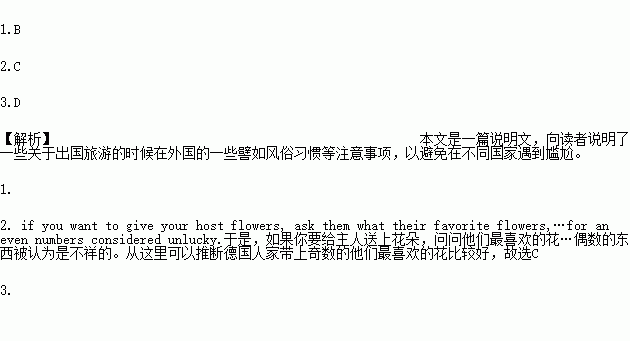题目内容
Traveling to a new country isn't as simple as just buying a ticket and boarding a plane. In fact, it can be easy for an awkward situation to occur. Different customs can often cause misunderstandings and even trouble. So an article in the Daily Mai highlighted taboos in certain countries. Let’s take a look.
France When visiting France ,you’d better not be caught cutting your lettuce(生菜)with a knife and fork. It’s rude to the chief cook and suggests that the salad hasn’t been prepared correctly. The correct way to eat lettuce in France is to fold it with your fork to make it fit in your mouth. | Italy 02 It’s actually best to be a little less friendly than usual when you visit Italy. It’s considered strange to make small talk with strangers, as the locals are reserved. Too much familiarity from a stranger can be seen as threatening, so keep greetings short. |
In Mexico , bringing an expensive gift to someone’s home is a no-no ,as ye could be seen as something for you .Something simple like flowers and chocolates would be accepted. But you can’t take along marigolds (金盏花)or red flowers , because in Mexican culture, they symbolize death and can be associated with the use of magic. Mexico | You have to be careful with gifts of flowers in Germany too. Fox example, carnation (康乃馨) are used for a religious ceremony for burying a dead person .So if you want to give your host flowers, ask them what their favorite flowers, And if your bring your host eight flowers . he or she won't be happy, for an even numbers considered unlucky. Germany 04 |
1.The underlined word“ taboo” in the first paragraph refers to a social custom that mean a particular activity must be .
A. Held B. Avoided C. undertaken D. protected
2.According to the passage,as a tourist, you can .
A. send red flowers or chocolates to your friend in Mexico
B. never talk with strangers happily for a short time in Italy
C. visit your friend with eleven marigolds he or she likes best in Germany
D. never fold your lettuce with your fork to make it fit in your mouth in France
3.The purpose of the passage is to help in a new country.
A. acquire the latest information
B. deal with an awkward situation
C. learn how to get on with strangers
D. prevent an emharrassing mistake
 优加精卷系列答案
优加精卷系列答案
